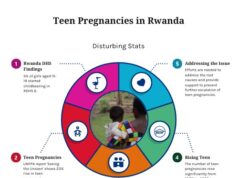
By Kelly Rwamapera
The government of Rwanda has thrown doubt on the use of electronic bracelets to monitor suspects and convicts in its efforts to reduce the prison population.
The Secretary-General at Rwanda Investigation Bureau told reporters in a press conference on February 8, 2024, that the government found electronic monitoring too expensive.
“We found it to be an expensive undertaking. The government cannot afford to secure the bracelets in a significant number that bring change in the prison population,” Col. Jeannot Ruhunga told journalists at Rwanda’s Supreme Court in a press conference.
Col Ruhunga added that the government would secure a few electronic bracelets for convicts and suspects who can afford to pay for them and the entire monitoring.
“An inmate who qualifies to be released will pay for the bracelet. It is too expensive for the government to secure it for everyone who deserves it free of charge,” he added.
The Civil law nation adapting itself to the Common law system is struggling with a high prison population that has not been solved even by extending incarceration infrastructures.
According to Statista, Rwanda ranks third in the leading nations with high incarceration rates, with 637 inmates per every 100,000 people in its population as of January 2024.
Rwanda Correctional Service (RCS) statistics show there have been over 89,000 inmates across the 13 correctional facilities in the country since 2023.
The country already spends Rwf1.4 million per inmate per year of incarceration, according to RCS.
In early 2022, the government launched measures to reduce the prison population by 15000 in three years and reduce the number of new inmates sent by courts.
The measures included the use of electronic bracelets to monitor suspects who would otherwise be in prison before sentencing.
Electronic bracelets would also monitor convicts on community work instead of being in prisons.
Col Ruhunga explained that the government is looking for more effective and affordable measures that can significantly reduce the prison population and provide the judges with several options other than sending every convict to prison.
The government is also looking at parole and plea bargaining introduced in 2022 as some of the ways to decongest prisons.
Since 2022, about 3000 inmates have been granted release on parole and presidential pardon.
Through negotiations of agreements between the prosecution and the accused, otherwise called plea bargain, 621 inmates have been released while over 1000 have received lighter sentences since 2022.













